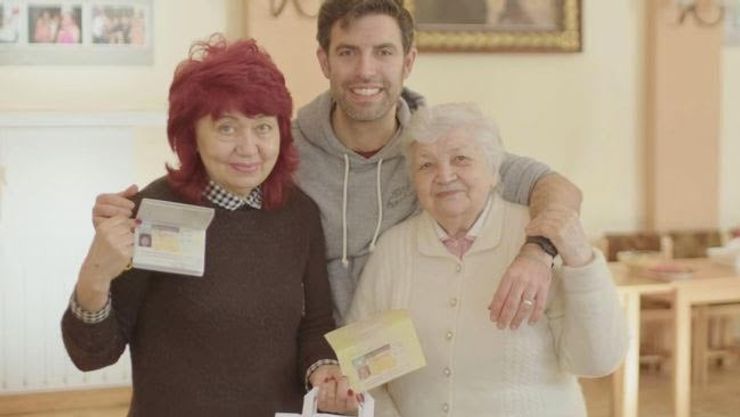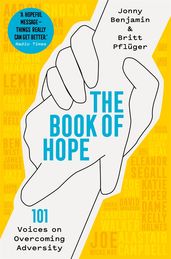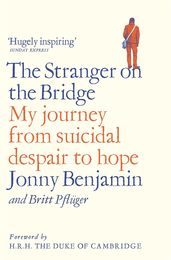Advice on how to stay hopeful, even when it's really hard
If you’re not feeling like ‘you’, you’re not alone. Here, award-winning mental health campaigner Jonny Benjamin shares practical advice on how to stay hopeful despite the headlines.

In January 2008, Jonny Benjamin found himself on Waterloo Bridge on the verge of jumping. He was twenty years old. Seeing his distress, a stranger stopped to talk to him and, with a single conversation, saved his life.
Six years later, Jonny began a search for the stranger on the bridge via social media. His search was followed by 319 million people around the world, and ended when at last, Neil Laybourn was found and Neil and Jonny’s firm friendship began.
Now an influential activist changing the culture around mental health awareness, the recipient of an MBE and the author of two books, Jonny is a voice of authority on the power of hope: how we lose it, and crucially, how we find it again.
As the headlines continue to take their relentless toll on us all, many of us are finding it hard to see a light at the end of the tunnel. Here, Jonny shares how we can all find hope and a way forward even when it seems impossible.
If there’s one thing that I’ve learned about human beings from both my personal and professional experience with mental health, it’s that we are often a lot more resilient than we give ourselves credit for.
This truth is at the heart of The Book of Hope, which I co-wrote with Britt Pflüger. We wanted to curate a collection of stories from voices who have all overcome adversity, to give hope to others that they are able to do the same. While Britt and I actually started it before the world seemed to turn upside down in 2020 with the pandemic, this chorus of voices seems especially important today.
Personally, I feel that things have never been quite the same since then, and that hope is desperately needed more than ever before.
For the last couple of years, I’ve awoken every morning with a sense of fear and trepidation; from the start of the spread of covid to the current state of war in Ukraine, I am terrified every time I switch on the news or log in to social media about what I am going to see.
I am certain that this overwhelming suffering we're seeing on social media is one of the reasons we are currently seeing a spike in mental health challenges. At the youth mental health charity I founded, Beyond, we are inundated with requests for help, particularly from young people experiencing anxiety and trauma. We need to address what I believe is fast becoming a mental health crisis, and we have to instil hope at every opportunity possible.
A hero of mine, Elie Wiesel, who is a Holocaust survivor, wrote:
‘Even in darkness it is possible to create light. Even inside a prison it is possible to feel free.’
— Elie Wiesel
The truth is, however, that I am struggling to find hope given the events happening in the world at present: war, coronavirus, poverty.
All of these things have built to such a crescendo, and there are simply no words to describe the horror of what we are witnessing in Ukraine especially. How can one have any hope in the midst of such suffering?
But hope we must and, like the many inspiring voices who lend their words to The Book of Hope, we, too must endure.
I have found over the course of my own relationship with my mental health, practical ways to feel more light, free, and hopeful even in these most difficult of times, and I want to share them with you.
- Limit consumption of news apps/channels. Also try to access more positive stories through websites such as Positive News.
- Be mindful of social media usage. Curate your feed on Facebook, Instagram, LinkedIn, Twitter etc so you’re following people that inspire and uplift you.
- Connect with nature. We all know of the healing power of nature, but sometimes we forget to truly take advantage of Mother Nature’s gift to us. Leave your phone at home (or switch on “do not disturb”/turn off notifications) when you’re out in it.
- Practice gratitude. Every day I write down at least 3 things I’m grateful for. Even in the darkest of times it is possible to find these things e.g. music, family, pets, faith, chocolate etc.
- Practice self-compassion. This is particularly important during challenging periods. Simple things such as giving yourself a hug, practising self-compliments, or taking time for rest, can make a big difference. Dr Kristin Neff has some great resources on self-compassion via her website.
If hope is one side of the coin, resilience is the other.
I want to share with you the story of Kateryna Razumenko who, only a month ago, was forced to flee her home in Kharkiv, Eastern Ukraine, along with her daughter Layrsa, due to heavy shelling in the area.
Growing up, 90-year-old Kateryna also survived the 'Holodomor', a man-made famine that hit Ukraine from 1932 to 1933 because of Stalin's policies. It killed millions. She then endured the terror of a Nazi invasion and the Holocaust a few years after, as well as the fallout from the Soviet Union’s collapse later in 1991.
On March, Kateryna and her daughter grabbed their handbags and their beloved 15-year-old cat Solomon and took the first train they could to Lviv in Western Ukraine. A couple of days later they all arrived in safety at a refugee centre in Poland.
It is then that my colleague and friend, Zac, who is Larysa’s son-in-law, flew out to meet them and help obtain their visas to the UK to join his wife and family. I spoke to Zac several times while they waited to get the visas, and he told me that Kateryna, who has dementia, remarkably was “always in strong spirits”.

On 12th March, Kateryna, Larysa and Zac finally landed at Heathrow, where they were met by the rest of the family. Since then, the local community in North London has rallied around them in the most extraordinary way, even providing a home for Kateryna and Larysa, who is disabled. This past weekend, after a lengthy delay, they were reunited with Solomon the cat, who has been on his own remarkable journey from Ukraine as well.

Kateryna’s story is one of resilience, hope and strength in the face of tremendous suffering, and I hope that by sharing her story, you take comfort, as I do.
It resonates with the quote which I live by from C.C. Scott:
‘The human spirit is stronger than anything that can happen to it.’
— C.C. Scott
If you're looking for ways to support Ukraine find out how you can help here, and if you're in need of mental health support, Shout offers 24/7 text support and more resources can be found on Hub of Hope, the UK’s leading mental health support database.
The Book of Hope
by Jonny Benjamin
and Britt Pflüger
From the best advice you’ll ever get to the joy of crisps, the brilliant contributors to The Book of Hope will help you to find joy whenever you need it most. These 101 key voices in the field of mental health - including the likes of Lemn Sissay, Dame Kelly Holmes, Frank Turner, Joe Wicks and Elizabeth Day - share not only their experiences with anxiety, psychosis, panic attacks and more, but also what helps them when they are feeling low.
The Stranger on the Bridge
by Jonny Benjamin
In 2008, Jonny Benjamin stood on Waterloo Bridge, planning to jump, until a stranger stopped to talk to him. That stranger saved Jonny’s life. In his candid memoir, Jonny tells the story of how he got to the bridge in the first place, how he continues to manage his diagnosis of schizoaffective disorder, as well as what happened when he tried to find the stranger who helped him, six years later. The Stranger on the Bridge is a book about second chances and the power of connection.
For more inspiring reads surviving through the darkest times, discover these books about the holocaust.




